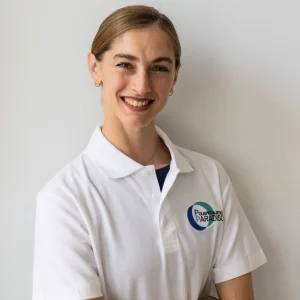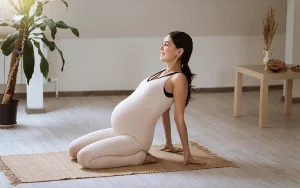Why practise Pilates during pregnancy?
Pregnancy is one of the most intense and transformative times in a woman’s life. Both body and mind go through profound changes that can bring new sensations, joy, but also fatigue and fears. During this delicate journey, Pilates proves to be a valuable ally for both physical and emotional well-being.
Here’s how this discipline can support you throughout the nine months of pregnancy:
1. Strengthening and toning muscles
During pregnancy, the body produces an important hormone called relaxin, which makes the ligaments more elastic to prepare the pelvis for childbirth. However, this increased flexibility can lead to joint pain and instability.
Through targeted and safe exercises, Pilates helps strengthen both deep and superficial muscles, stabilising the joints and preventing musculoskeletal discomfort. In particular, strengthening the glutes, back and legs helps support the growing bump.
2. Posture improvement
As the breasts and abdomen grow, the spine often changes its natural curves: thoracic kyphosis (rounded shoulders) and lumbar lordosis (arched lower back) tend to increase.
Pilates helps restore postural balance, teaching more mindful and correct movements that ease tension and reduce common pregnancy aches in the neck, shoulders and lower back.
3. Pelvic floor health and prevention of abdominal separation
Core engagement is a key element of Pilates. During pregnancy, working correctly in this area means:
Learning to control pelvic floor activation and relaxation, which is essential during labour and for postnatal recovery;
Preventing or minimising diastasis recti (the separation of the abdominal muscles) through safe deep core strengthening.
4. Improved balance
As the bump grows, the centre of gravity constantly shifts, affecting balance and stability in daily movements.
With carefully adapted exercises, Pilates enhances proprioception and body control, making movements safer and reducing the risk of falls.
5. Circulation and overall well-being
Many expectant mothers experience swelling, heavy legs and circulation problems. The circulatory exercises used in Pilates promote venous return, reduce fluid retention and create a pleasant feeling of lightness and well-being.
6. Emotional support and connection
Pregnancy brings emotional as well as physical changes. It’s common to feel fears, doubts and insecurities. Practising Pilates in small groups dedicated to expectant mothers offers the opportunity to share the journey, build new friendships and face this special time with greater calm and confidence.
At Polispecialistico Paradiso, our qualified team is here to guide you through this unique journey, offering personalised and professional support.
Don’t hesitate to contact us for more information or to book a consultation.
Your Polispecialistico Paradiso Team


